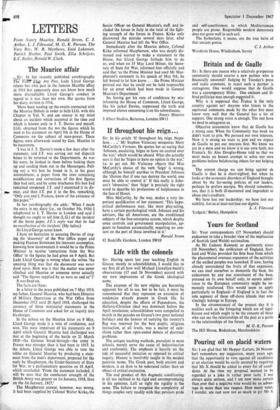The Maurice affair
LETTERS
From Nancy Maurice, Ronald Strom, C. I. Arthur, L. I. Filewood, M. G. K. Pierson, The Very Rev. W. R. Matthews, Enid Lakeinan, Patrick thither, Paul Sinith, Elka Schrijver, S. C. Butler, Ronald W. Clark.
Sir: In her recently published autobiography The YeriAP Thal Arc Past, Lady Lloyd George relates her own part in the famous Maurice affair in 1918 but apparently does not know how much more discreditable Lloyd George's conduct in regard to it was than her own. She quotes from her diary, written in 1934,
'Have been reading up the events connected with the Maurice Debate in order to help L1.G. with this Chapter in Vol. V, and am uneasy in my mind about an incident which occurred at the time and which is known only to J. T. Davies and myself. LI.G. obtained from the wo the figures which he used in his statement on April 9th in the House of Commons on the subject of man-power. These figures were afterwards stated by Gen. Maurice to be inaccurate.
'I was in J. T. Davies's room a few days after the statement, and J.T. was sorting out red dispatch boxes to be returned to the Departments. As was his wont, he looked in them before locking them up and sending them out to the Messengers. Pull- ing out a wo box he found in it, to his great astonishment, a paper from the DMO containing modifications and corrections of the first figures they had sent, and by some mischance this box had remained unopened. J.T. and I examined.it in dis-
h*. may, and then J.T. put it in the fire, remarking, "Only you and I, Frances, know of the existence of this paper." '
In her autobiography she adds: 'When I made the entry in my diary (i.e., on October 5th, 1934) I telephoned to J. T. Davies in London and said I thought we ought to tell him (L.G.) of the incident of the burnt paper. J.T.'s reply was that he had no recollection of the incident.' (My italics.)
So Lloyd George never knew.
I have no hesitation in accusing Davies of stag- ing the 'discovery' of the War Office paper and making Frances Stevenson his innocent accomplice, knowing how inconvenient it would be to the Prime Minister to receive 'corrections from the War Office to the figures he bad given on 9 April. But Lady Lloyd George is wrong when she writes 'the amazing thing was that the document was never fixed upon. How was it that the matter was never clinched and Maurice or someone never actually said "The figures supplied by us were so and so"?'
It was fixed on.
The facts are these:
In a letter to the press published on 7 May 1918, my father, General Maurice, who had been Director of Military Operations at the War Office from December 1915 until 20 April 1918, challenged the accuracy of three ministerial statements in the House of Commons and asked for an inquiry into his charges.
In the debate on the Maurice letter on 9 May, Lloyd George made it a vote of confidence, and won. The most important of his statements on 9 April which General Maurice had challenged was that at the beginning of the battle on 21 March 1918—the German break-through—the army in France was stronger than it had been in 1917. In the debate, Lloyd George was able to turn the tables on General Maurice by producing a state- ment from the DMO'S department, prepared for the reply by Macpherson, the Under-Secretary of State for War, to a parliamentary question on 18 April, which concluded: 'From the statement included, it will be seen that the combatant strength of the British Army was greater on 1st January, 1918, than on the 1st January, 1917.'
The Macpherson answer, however, was wrong. It had been supplied by Colonel Walter Kirke,. the
Senior Officer on General Maurice's staff, and in- cluded the forces in Italy in the total of the fight- ing strength of the forces in France. Kirke only discovered the mistake several days later, after General Maurice had left the War Office.
Immediately after the Maurice debate, Colonel Kirke informed Macpherson, who was deeply dis- tressed and wanted to make a statement to the House, but Lloyd George forbade him to do so, and when on 15 May Lord Milner, the Secre- tary of State for War, informed him officially and said that 'as the Prime Minister had used Mr Mac- pherson's statement in his speech of May 9th, he felt bound to let him know . . . the Prime Minister pointed out that he could not be held responsible for an error which had been made in General Maurice's Department.'
So, having got his vote of confidence by mis- informing the House of Commons, Lloyd George, like his jackal Davies, suppressed the truth and imposed silence concerning it on his subordinates. Nancy Maurice 5 Albert Studios, Battersea, London SW11


































 Previous page
Previous page